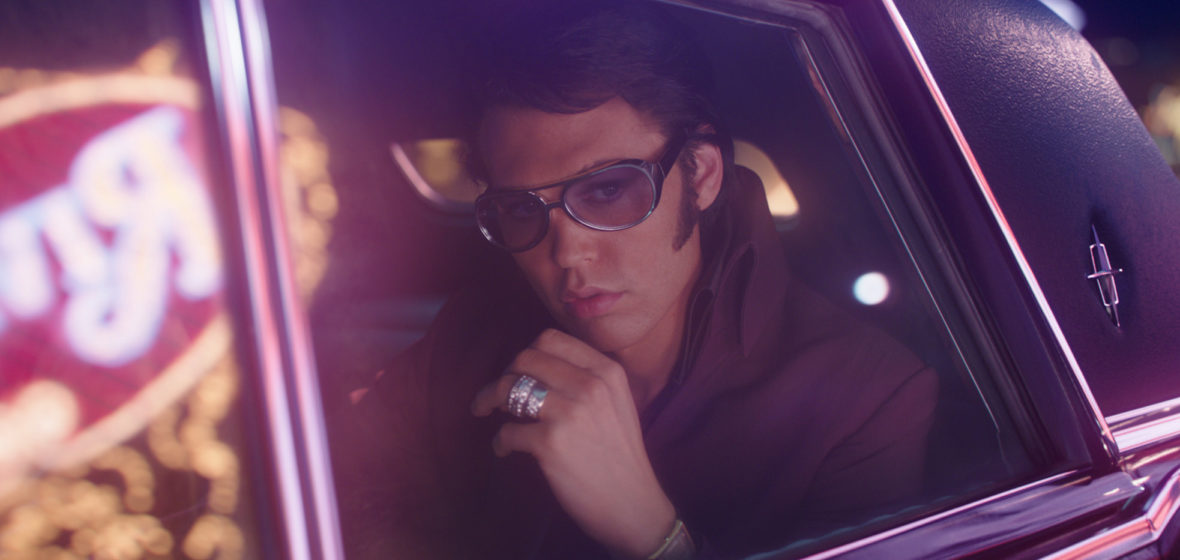It’s been long said that you’re either into Baz Luhrmann films or you aren’t. These distinctive camps have been formed with good reason – for all the wild and untamed whimsy of Romeo + Juliet, there’s the overworked, under cooked dough of Australia. For the raw beating heart of Moulin Rouge! there’s the beautiful but fragile empty shell of Gatsby.
Elvis begins, like many Luhrmann films, by dropping us with an explosion of colour, music and light right in the centre of the action – in this case, smack bang into early 70’s Vegas. We all know where this story ends – Elvis is strung out, propped up with pills, battling creeping paranoia and poured into tight fitting jumpsuits on his brisk march to an early grave aged just 42.
But climb aboard, there’s no time to waste – like a carnival ride spinning round and round, we are whisked through the narrative of Elvis’ life through the imperfect lens of his notorious manager Colonel Tom Parker (a fat-suited, heavy accented Tom Hanks).
“The villain of this here story”, we begin too, at his end. He lies alone in a hospital room at the close of his life, alternately reflective and abrasively unrepentant. The last man standing in the sideshow, the only one left to tell the tale.
You have a favourite Elvis? We all have a favourite Elvis, surely. You’ll find them all here on this whirly-gig – from the snake-hipped Elvis thrusting his way into national controversy on broadcast television, to Army Elvis, Hawaii Elvis, comeback special black leather clad Gospel Elvis (a personal fave), to his final form of rhinestone-karate-shoot-the-TV Vegas Elvis. Austin Butler, in an impressive piece of casting, brings both a doe eyed vulnerability, and a raw, “the-hell-with-it-I’m-chucking-my-knickers” hot-flush intensity to the titular role.
The film brims with lively set pieces, designed to the absolute hilt, impeccably styled smash cuts whirling between time and place, roaring with music — a joy and a delight. Does it lack a little in its narrative thread? Sure – I walked out with no additional insights into what drove Elvis, or Tom Parker for that matter.
Almost like a checklist of things that could form the core essence of a man, brief mention is made of the twin brother who died at birth, the relationship with his deeply damaged mother, his desire for peace and stability in the wake of an impoverished childhood, the intoxication of stardom, but nothing with a significant enough emotional weight to convincingly catapult him through a lifetime of dreadful, dreadful decision-making. But, perhaps this doesn’t matter – we don’t jump on a Ferris wheel to examine its darkly grinding gears after all.
To be fair, there are some notable narrative beats – shown particularly when Elvis, out of the shadows (and sideshow-esque narration) of Tom Parker is shown in his creative flow – either soaked in the music which influenced him so deeply, or revealed in his defiant recording of the ‘68 comeback show TV special. The bond Elvis shares with his young bride Priscilla (played with kohl-rimmed sweetness by Olivia DeJonge), reveals a tender intimacy sometimes overshadowed by the tragic hedonism of his final years.
There are moments of absolute, face-cracking joy in this film – I defy you to not break into delighted toe tapping as the orchestra works the opening number of his first Las Vegas residency, or to not grin from ear to ear as Elvis, having promised to not even wiggle his little finger at a Memphis show, arcs his hips so vigorously at the crowd that his body bends into a tippy-toed gravity-defying C shape to the absolute horror of the police and screams of the young female audience.
Is this the most profound or even truthful portrait you’ll encounter of Elvis? Perhaps not, but just like a carnival ride, as we return to where we started – a full circle, the delight lies not in the destination, but the thrill of spinning around in the music and sparkly lights again and again and again.




